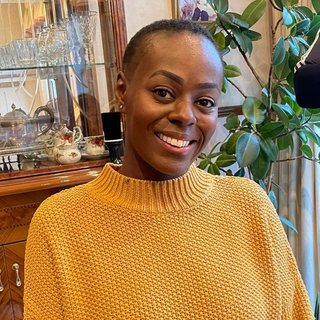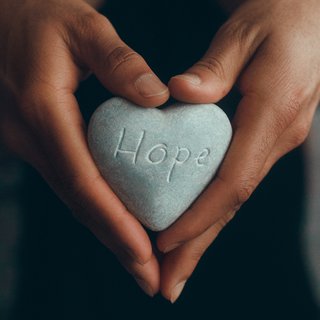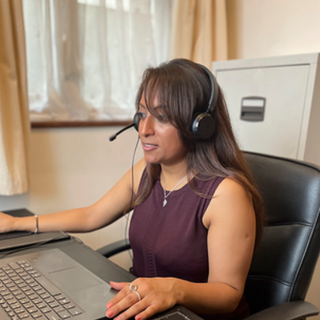Facing the stigma of blood cancer
Linda found out she had myeloma in March 2021. She talks frankly about dealing with the stigma of being diagnosed with blood cancer and how she’s working through it.
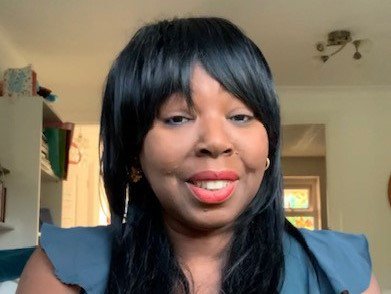
Linda is from African Caribbean heritage (Jamaican descent) and was born in England. She has been a Christian since she was 16 years old.
I can’t talk for everybody who’s Black, or Christian, and I don’t want to generalise. But perhaps some things I’ve observed and experienced as a Black British woman and a born-again Christian may resonate with other people in my community, especially if they’ve been diagnosed with cancer and a blood cancer in particular.
The big C
Cancer is a hard word for any community. A word no one wants to say. I think that in the Black community that difficulty is exacerbated. People with the diagnosis struggle to speak about it openly.
When I was diagnosed with myeloma, I felt a sense of stigma. I couldn’t even say the word ‘cancer’ as it related to me.
I’m quite a communicative, confident, assertive person, but I found it difficult to share what was happening and attach the word “cancer” to it. Instead, I would refer to my “poorly bones” as a way of letting people know that my whole bone structure was affected, but without telling them too much.
I think the term “blood disease” carries an extra stigma because of the imagery it conveys – the historical taboos around menstruation and uncleanness. Of course blood cancer has nothing to do with menstruation. But I think this further exacerbates issues for Black and Asian females.
Blood is significant in the Christian faith too. We talk about being healed by Christ’s own perfect blood, so if yours is said to be diseased, it can be a challenge.
It’s interesting that I don’t see many Black women or men in the treatment bay, but of course they are out there, somewhere. Myeloma disproportionately affects this group of people, so maybe it’s just timing and circumstantial.
Perceptions of disease
I think that disease in general has a big impact on Black and Asian communities. My parents came to the UK from Jamaica in the 50s. For that generation, any sickness or disease was devastating because they were working nonstop to put down roots and make a life here while still supporting children and families “back home”. I suspect there wasn’t much time to stand still, nor for grief and sickness.
I don't know how they treat cancer in Jamaica, or what people see or know, as I was born here. But maybe for my mum and older relatives, it’s the memory of it as potentially terminal that causes the awkwardness, inappropriate responses and sometimes a shut-down in communication.
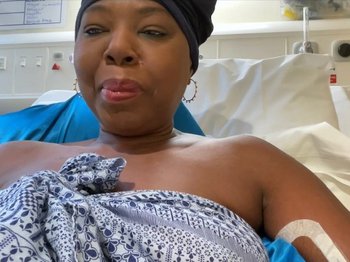
Negative assumptions
People‘s negative experiences of cancer or where they are in their own faith journey can pull you down when you want to feel buoyant. One woman grabbed me at a church event when it was evident I was unwell (I had my walking tripod with me). She grabbed me by the arm and was about to launch into a public “hands-on” prayer for me in a recess, which of course is not how to do it!
People want you to get well, but in my experience, they are shocked I am coping. They seem to expect a bad report. At family and social gatherings, I’ve felt like they’re talking to you, but checking you out for signs of the cancer. Friends (both Black and white friends I might add) seem surprised that you’re still standing, that you can laugh, that you want to present as you do, or indeed still might want to dress up.
They don’t listen when you say you’re doing well, there’s no sign of the disease left in your blood. It doesn’t tie in with what they think they know.
This has made me think it might have been better not to tell some people, because they monitor your progress. I can understand why some people don’t tell.
In fact, if I tell someone I have myeloma, I often get back, “Oh I know someone with that” and then they go on to say that they passed on. Without thinking what that might sound like to me! In my experience to date, people become awkward, lose all sensitivity and humanity around how to empathise with someone who has cancer.
Cancer and Christian healing
I come from a strong faith structure where the tenets are about healing and deliverance. So you can appreciate how this might impact when you become (or remain) sick, despite best prayers.
In the Christian healing ministry we say that “death and life is in the power of the tongue”. That's one of the Scriptures. It means you get what you say. You are not supposed to “claim” cancer. If you say it, you are giving it power. You’re owning it. I think this can leave an individual struggling to know how to be open about their diagnosis and what language to use.
My tests and reports have been good and I now speak in the past tense. It is my view that I am healed and healing is a process. Myeloma causes porous damage to bones which needs remedy, even if the disease is no longer evident. The issue around language has been difficult and I think we need a better understanding of this cross-culturally, and from a faith perspective.
There has been so much in the media recently and seeing young, assertive people like Dame Deborah James – Bowel Babe – talking about cancer so openly has given me the confidence to talk about my own journey and feel that there is nothing to be ashamed of.
Cancer is not as a result of some great sin that I've recently committed. It’s not a punishment. It's just something that happens. Sickness can come to anyone, and from a Christian perspective, as a result of the Fall.
Some people’s faith is shaken by illness, but that hasn’t happened to me. I believe that life is a staging post and we’re just passing through. We’re given an assignment, and some people get 70 years, some people get 30 years. I don’t know how many years I’ve been allotted, but I know that death isn't the end. And that gives me comfort.
Evidence of my recovery
I made a video when I was first ill in 2021, when I came out of hospital. I was so skinny. I looked very poorly. I am a media boffin anyway, but I made it for my mother and for people who hadn’t seen me for some time because of the lockdown.
I wore my heart on my sleeve in that video and I don’t think I realised how ill I was – physically, emotionally and spiritually fragile. As Christians we acknowledge the tripartite nature of an individual.
At the time, I wanted to use video to record events because one can trip up with dates and events when ill and on medication, particularly during the lockdown. I found it helpful and therapeutic.
When I look back and see how poorly I was and where I am now, I see the evidence that I am recovering and of course, I will survive.
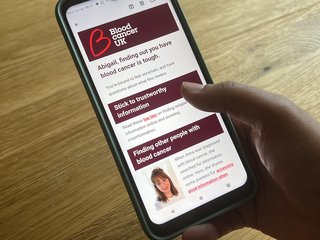
Get a weekly support email from us
We'll send you clear and simple information, practical tips, and advice from other people with blood cancer, to help during the first few weeks and months after diagnosis.

